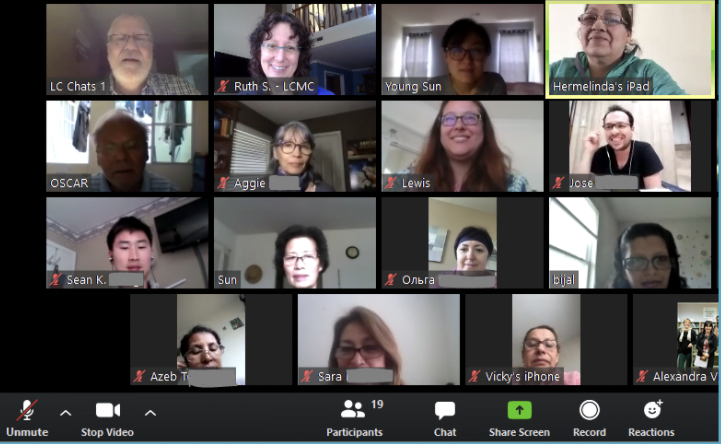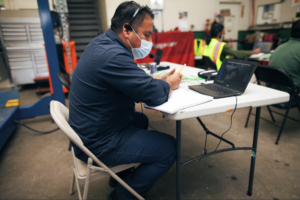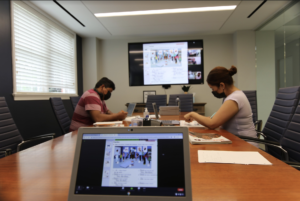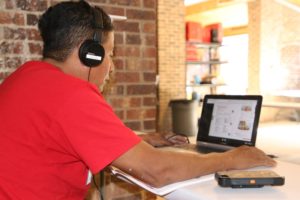How My Program Thrived in the Pandemic

by Ahu Moser
“Although we have had challenges, we have also had great success in many areas during online instruction for students, teachers, and for administrators.”
My heart sank when my boss suggested we take a break from instruction for the next couple of weeks in March, 2020. I knew that these two weeks would last longer, but I never thought that we would still be remote after 19 months of online learning.
I work for the Literacy Council of Montgomery County (LCMC) in Montgomery County (MoCo), Maryland as the program administrator serving close to 2,000 students annually. We used to say, “We are small”. This does not apply to us anymore, especially since the pandemic started. The pandemic has taught us we are not small, but we are mighty considering what we have accomplished in our organization, and in instruction. I am extremely proud of all the work that staff, instructors, and students have put in for the last one and a half years.
Programs have been challenged with so many elements since the pandemic hit. Grant-funded programs like ours have strict guidelines to follow. We have had to act fast without any delays—or any long breaks— because we had requirements to follow, classes to hold, and programming to continue regardless of the situation in which we found ourselves.
We can talk a lot about challenges, failures, the digital divide—and a lot more reasons about why online learning may be terrible or not produce a lot of compelling success stories. I am not going to talk about these because I believe that adult educators, students, and program administrators have accomplished a lot in the last 19 months, and we NEED to talk about our successes to move forward.
Although I am a program administrator, I am a teacher first and at heart. My organization is a non-profit that serves adults age 18 and older. We teach English as a second language (ESL), GED® preparation, digital literacy, workplace instruction, and more. Although we have had challenges, we have also had great success in many areas during online instruction for students, teachers, and for administrators. Let me highlight some of our successes with remote learning.
 |
 |
| LCMC offers workplace ESL classes. | |
Improved Processes
Think about doing registration for the public before the pandemic. We had to reserve rooms and classrooms in our county to do registrations. Most adult education programs do the same thing if they do not have a big space for registration, intake, and testing. Moving these processes to the online environment helped ease the load of staff and decreased the expense of managing space.
 |
 |
| Small online class size allows for more personalized instruction with LCMC. | |
Small Group Instruction
While it may be hard for a lot of students in online instruction because Zoom or Google Meet sessions can be very tiring and over-whelming, online instruction provides the opportunity for more individualized instruction. Before, in-person classes always had between 10 and 15 students. Now, our online class sizes are smaller. Placing students in online classes with less than 10 people helped our teachers easily manage their classes and give focused attention to learners.
Professional Development Opportunities for Instructors
Remote learning caused an immense shift in our professional development for instructors. We started offering easy, hands-on, and relatable professional development opportunities via Zoom or Google Meet. It did not matter how long a teacher had been teaching. We were all new to online learning. When we started, we made sure to relay one important message to our teachers—our professional development opportunities were not mandatory. We hoped that our teachers would value professional development opportunities that were practical and useful to their teaching. First, we wanted our teachers to hear from experts so we invited guests. Additionally, we wanted to do something fun. We called our professional development opportunities “Virtual Brown Bags” and held these every Friday. Attendance increased every week and instructors saw the value in these meetings. Before the pandemic, finding the right time to do workshops was hard. Every instructor had their own scheduling issues with personal or religious reasons. Having online workshops during the pandemic has proven that workshops do not have to be lengthy, they can be focused on our current needs, and they can be fun.
A Focus on Belonging
Living through a pandemic is not easy. Our learners have other priorities such as finding or going to a job, supporting their families, and a plethora of other challenges. And yet, our students chose to attend classes online despite their challenges and life priorities. One of the most significant successes that we have had is building community. When online learning takes place, we are invited into the homes of our learners. And while creating relationships is not easy during online learning, our program worked with instructors to implement fun and engaging activities while giving space to our learners to communicate openly. Little things such as staying on camera, involving family members, and being patient helped our learners thrive. We have found that connections are what can allow teachers and administrators to keep persisting when it gets hard.
Being Simple
You might wonder what “Being Simple” is. After so many class observations, meetings, and feedback sessions, I could tell you that I have learnt that being simple is the key to a successful online learning experience. There are so many apps, learning management systems, and portals available for online learning. In our experience, having so many resources overwhelmed the students. This is why we worked hard to make online learning accessible to students and teachers by keeping tasks simple while still requiring depth of knowledge. Instead of assigning seats to students in different portals that require programs to spend tons of money and take so much time, we offered easy ways for our learners to complete assignments and have access to their student books. Keeping things simple also improved accessibility for learners who did not have good access to Wi-Fi and computers.
The last 19 months have been very challenging, full of new learning opportunities and discoveries every day. As I stated at the beginning, while there are many issues and problems related to online learning, I have decided to bring out the positives that have led to successes in our program. Here’s hoping to learn more and exploring new things with our adult education students!
 Ahu Moser is the Senior Director of Academic Programming at Literacy Council of Montgomery County (LCMC) in Maryland. In her role, she oversees LCMC’s MD LABOR and MCAEL- funded 60-hour classroom program, which offers 100 classes per fiscal year while employing 27 teachers. She also manages additional programs such as LCMC@Work and Small Online Group Learning. Ahu was born and raised in Turkey and has a B.A. in English as a foreign language and education. She holds an M.Ed. in adult education from Strayer University and is currently pursuing her Ed.D. degree in curriculum and instruction at American College of Education. Ahu is an expert speaker, presenter, and workshop facilitator at both the local and national level regarding assessment, curriculum and instruction, adult learning theory, and teacher support.
Ahu Moser is the Senior Director of Academic Programming at Literacy Council of Montgomery County (LCMC) in Maryland. In her role, she oversees LCMC’s MD LABOR and MCAEL- funded 60-hour classroom program, which offers 100 classes per fiscal year while employing 27 teachers. She also manages additional programs such as LCMC@Work and Small Online Group Learning. Ahu was born and raised in Turkey and has a B.A. in English as a foreign language and education. She holds an M.Ed. in adult education from Strayer University and is currently pursuing her Ed.D. degree in curriculum and instruction at American College of Education. Ahu is an expert speaker, presenter, and workshop facilitator at both the local and national level regarding assessment, curriculum and instruction, adult learning theory, and teacher support.